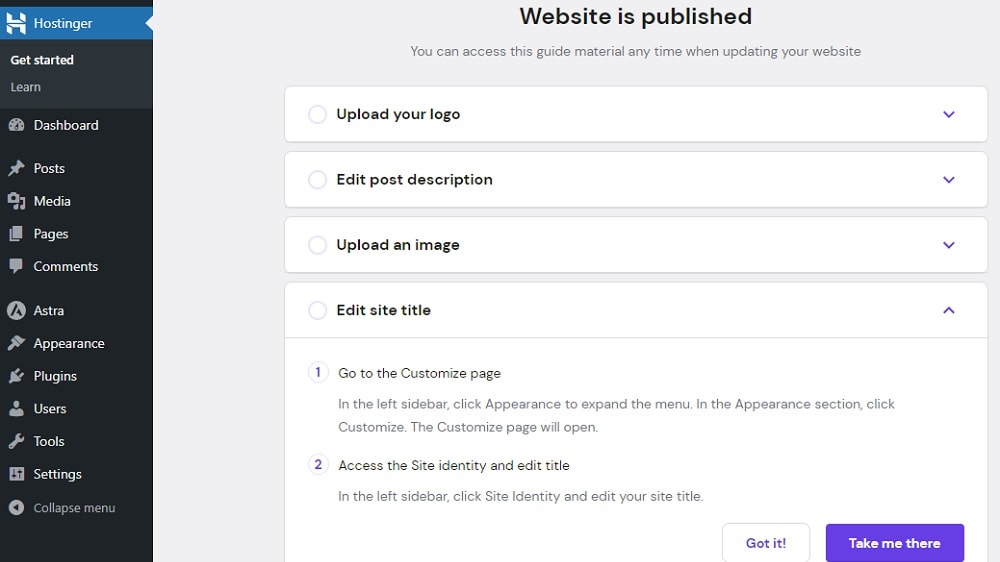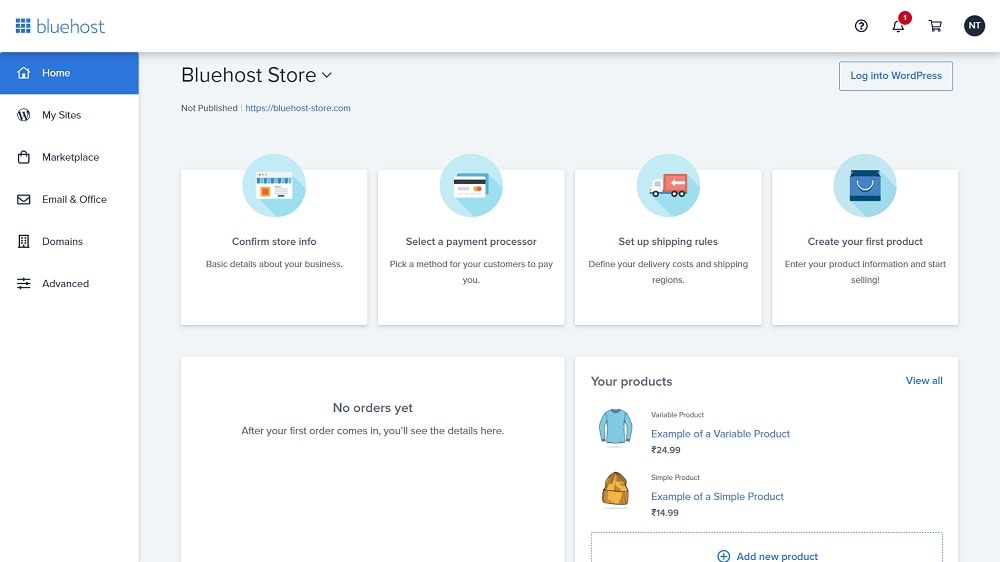Hostinger vs Bluehost compared: Choosing the best hosting provider
- 01Hostinger vs Bluehost: overview
- 02What's the difference between Hostinger and Bluehost?
- 03Hostinger pros and cons
- 04Bluehost pros and cons
- 05Hostinger compared to Bluehost
- 06Bluehost compared to Hostinger
- 07Features comparison
- 08Hostinger vs Bluehost: Which is the best for your business?
- 09Promotions on Cloud Storage software
- 10Alternatives to Hostinger & Bluehost
Save up to $144 on Hostinger
Save up to $144 on Hostinger
No-code website hosting services have revolutionized the way individuals and businesses create and manage their online presence. With the rise of website building platforms, like Hostinger and Bluehost, individuals with little to no coding experience can easily create and customize their websites. These hosting services provide a user-friendly interface, allowing users to design and launch their websites tailored to their specific requirements, whether it's a personal blog, an e-commerce site, or a corporate website.
Given the abundance of hosting options available, the decision-making process can be daunting. In this article, we'll delve into the world of website hosting with a focus on Hostinger vs Bluehost. By examining their features, advantages, disadvantages, and key distinctions, you can make an informed choice and select the hosting provider that best aligns with your website's needs and your overall online presence.
Hostinger vs Bluehost: overview
Hostinger and Bluehost are prominent players in the web hosting industry, each offering a diverse array of features and hosting solutions. Navigating the decision between these two hosting providers can be a complex task, given the numerous factors to consider.
To simplify your decision-making process, we have prepared a comprehensive comparison resource that shines a spotlight on the key attributes of Hostinger and Bluehost. Utilizing a rating system and in-depth analysis, this comparison chart aims to equip you with the essential insights necessary to make an informed choice for your web hosting needs.
Whether you prioritize factors such as website performance, affordability, customer support, or scalability, our comparison will guide you through the Hostinger vs Bluehost landscape, helping you select the hosting provider that aligns most effectively with your specific website and business requirements.
What's the difference between Hostinger and Bluehost?


Hostinger and Bluehost are two well-established web hosting providers, each with its own set of distinctive features and offerings. To make an informed decision about which one suits your specific hosting needs, it's crucial to understand the differences between Hostinger and Bluehost.
One of the primary distinctions between Hostinger and Bluehost lies in their approach to hosting infrastructure. Hostinger is known for its cloud-based hosting solutions, offering users the benefits of scalability, reliability, and fast loading times. On the other hand, Bluehost primarily relies on shared hosting, which can be cost-effective but may lead to slower performance during peak traffic periods.
Another significant difference is the pricing structure. Hostinger is often lauded for its budget-friendly hosting plans, making it an attractive option for individuals and small businesses on a tight budget. Bluehost also offers competitive pricing but tends to be slightly more expensive than Hostinger, especially when it comes to renewals.
When it comes to customer support, Bluehost is known for its excellent customer service, offering 24/7 live chat and phone support. Hostinger also provides customer support, but it may not have the same level of availability and responsiveness as Bluehost.
The range of hosting options is another factor to consider. Hostinger offers shared hosting, VPS hosting, and cloud hosting, catering to a wide spectrum of users. Bluehost, while offering shared hosting and VPS hosting, is particularly well-known for its WordPress hosting solutions, making it a preferred choice for WordPress enthusiasts.
In terms of performance and speed, both Hostinger and Bluehost strive to provide reliable hosting, but Hostinger's cloud-based infrastructure often leads to faster loading times and better overall performance.
Additional 10% off on all 12/24/48-monthly plan purchases on Hostinger
Get Additional 10% off on all 12/24/48-monthly plan purchases on Hostinger and up to $144 savings with Secret.
Hostinger pros and cons
What are the advantages of Hostinger?
- Affordability: Hostinger is known for its budget-friendly hosting plans, making it an excellent choice for individuals, small businesses, and startups with limited budgets.
- Speed and performance: Hostinger utilizes a cloud-based infrastructure and provides features like SSD storage and a content delivery network (CDN), which contribute to fast loading times and overall website performance.
- User-friendly control panel: Hostinger offers a user-friendly control panel (hPanel) that simplifies website management, making it accessible to users of all skill levels.
- Strong security features: Hostinger provides robust security measures, including SSL certificates, automated daily backups, and a web application firewall (WAF) to protect your website from threats.
- 24/7 customer support: Hostinger offers round-the-clock customer support via live chat, email, and a comprehensive knowledge base, ensuring you have assistance whenever you need it.
What are the disadvantages of Hostinger?
- Limited resources on shared plans: Hostinger's budget-friendly shared hosting plans may have limited resources, which could lead to performance issues if your website experiences high traffic or resource-intensive tasks.
- Limited data centers: Hostinger has fewer data center locations compared to some other hosting providers, which may result in slower website loading times for visitors from certain regions.
- Pricing renewals: While Hostinger's initial pricing is attractive, renewal rates can be significantly higher, so you need to be prepared for potential cost increases when renewing your hosting plan.
- Limited advanced features: Hostinger's basic plans may lack some advanced features that more demanding websites may require, such as dedicated IPs or advanced developer tools.
- No traditional cPanel: Hostinger uses its custom hPanel, which, while user-friendly, may not be as familiar to those accustomed to the traditional cPanel interface.
Compare Hostinger to other tools
Bluehost pros and cons
What are the advantages of Bluehost?
- Reliable uptime: Bluehost boasts a strong track record of uptime, ensuring that your website remains accessible to visitors around the clock.
- WordPress integration: Bluehost is officially recommended by WordPress.org and offers seamless integration with the WordPress platform, making it an ideal choice for WordPress users.
- Beginner-friendly: Bluehost provides an easy-to-use interface and a variety of tools, making it suitable for beginners who may not have advanced technical skills.
- Customer support: Bluehost offers 24/7 customer support through live chat, phone, and email, providing assistance when you need it.
- Scalability: Bluehost offers a range of hosting options, including shared, VPS, and dedicated hosting, allowing you to scale your hosting plan as your website grows.
What are the disadvantages of Bluehost?
- Pricing renewals: Like many hosting providers, Bluehost's introductory pricing is lower than the renewal rates, which can be considerably higher. Be prepared for potential cost increases when renewing your hosting plan.
- Limited storage: Some of Bluehost's shared hosting plans may have limitations on storage space, which could be a constraint for websites with extensive media or data.
- Additional costs: Certain features, such as automated backups, domain privacy, and some security features, may come with extra costs, increasing the overall price of your hosting plan.
- Resource allocation: Shared hosting plans on Bluehost may suffer from resource limitations when shared with other users, potentially affecting website performance during traffic spikes.
- Limited data center locations: Bluehost has a limited number of data center locations compared to some other hosting providers, which may result in slower website loading times for visitors from certain regions.
Compare Bluehost to other tools
Hostinger compared to Bluehost
Hostinger and Bluehost are both prominent web hosting providers, but they differ in several key aspects. Hostinger is known for its affordability, user-friendly interface, and cloud-based infrastructure, offering fast performance.
On the other hand, Bluehost is officially recommended by WordPress, excelling in reliability and seamless WordPress integration. While Hostinger is favored by budget-conscious users, Bluehost's pricing tends to increase upon renewal. Hostinger's limited data center locations may impact website loading times in certain regions, whereas Bluehost offers a more extensive range of hosting options. Ultimately, your choice between Hostinger and Bluehost should align with your specific hosting needs and budget considerations.
Is Hostinger better than Bluehost?
When comparing Hostinger and Bluehost, the decision largely hinges on individual preferences and requirements. Hostinger appeals to those seeking cost-effective solutions without compromising on performance, thanks to its cloud-based setup and straightforward interface. This makes it an ideal choice for new or small-scale website owners.
In contrast, Bluehost stands out for its robust WordPress support and reliability, catering well to users who prioritize seamless WordPress functionality. However, the increase in cost upon renewal with Bluehost is a consideration for long-term budget planning. Additionally, while Hostinger's data centers might limit performance in some regions, Bluehost offers a diverse range of hosting services, catering to a broader audience. Therefore, the decision between the two should be based on a balance of budget, performance needs, and specific website requirements.
What is Hostinger best used for?
Hostinger is best used for individuals and small businesses seeking budget-friendly hosting solutions. It excels in hosting personal websites, blogs, and small to medium-sized business websites. Hostinger's user-friendly interface and affordable pricing make it an excellent choice for those with limited technical expertise and tight budgets.
Additionally, its cloud-based infrastructure and emphasis on performance make it suitable for websites that prioritize fast loading times. However, it may not be the ideal choice for large-scale enterprises or websites with extremely high traffic due to resource limitations on its shared hosting plans.
Can Hostinger replace Bluehost?
Whether Hostinger can replace Bluehost depends on your specific needs and preferences. Both Hostinger and Bluehost are web hosting companies that offer various hosting services, including shared hosting, VPS hosting, and dedicated hosting.
Hostinger is known for its affordability, offering hosting plans at very competitive prices. This makes it an excellent choice for individuals and small businesses looking for budget-friendly hosting solutions without compromising on performance and features.
Bluehost, on the other hand, is known for its strong reputation and long-standing presence in the web hosting industry. It is officially recommended by WordPress.org and offers a user-friendly platform with robust features. Bluehost's reputation for reliability and customer support can be a compelling reason to choose their hosting services, especially for those who value trustworthiness and a well-established provider.
Is Hostinger cheaper than Bluehost?
Hostinger’s pricing is generally cheaper than Bluehost. Hostinger’s pricing structure is known for its budget-friendly hosting plans, making it an attractive option for individuals, small businesses, and startups with limited budgets. Their introductory pricing is often significantly lower than that of Bluehost.
However, it's essential to keep in mind that hosting plan renewal rates for both providers can be considerably higher than the initial promotional prices. When comparing costs between Hostinger and Bluehost, it's advisable to consider both the initial and renewal prices, along with the specific features and resources offered by each hosting provider, to make an informed decision based on your needs and budget.
Is there a better Cloud Storage software than Hostinger?
Selecting the ideal web hosting software is a critical decision, one that hinges on a thorough evaluation of your unique hosting needs and goals.
While Hostinger stands out for its affordability and user-friendly features, it's essential to explore potential alternatives that might better align with your specific requirements. Other hosting providers, such as Bluehost, Cloudways, and Webflow, offer varying strengths and feature sets. These alternatives cater to a range of hosting preferences, from robust performance and reliability to specific hosting solutions tailored to content management systems like WordPress. By carefully examining these alternatives, you can make an informed choice that best suits your hosting needs.
Additional 10% off on all 12/24/48-monthly plan purchases on Hostinger
Get Additional 10% off on all 12/24/48-monthly plan purchases on Hostinger and up to $144 savings with Secret.
Bluehost compared to Hostinger
Bluehost and Hostinger are prominent web hosting providers, each with distinct offerings. Bluehost is renowned for its reliability and official WordPress endorsement, making it ideal for WordPress users. It provides a range of hosting options, including shared, VPS, and dedicated hosting.
In contrast, Hostinger stands out for its affordability and user-friendly interface, catering to budget-conscious users. It excels in cloud-based hosting with fast loading times. However, Hostinger's pricing may increase upon renewal. The choice between Bluehost and Hostinger should hinge on your hosting needs and budget, with Bluehost being a strong choice for WordPress-focused sites and Hostinger for cost-conscious users.
Is Bluehost better than Hostinger?
Deciding whether Bluehost is better than Hostinger involves assessing specific hosting needs and preferences. Bluehost's strong suit lies in its reliability and WordPress optimization, offering an array of hosting services, including shared, VPS, and dedicated options. This diversity makes Bluehost an excellent choice for users who prioritize WordPress integration and need various hosting solutions.
On the other hand, Hostinger is known for its affordability and simplicity, appealing to those on a budget or new to website hosting. Its emphasis on cloud-based hosting ensures quick loading times, an essential factor for many site owners. While Hostinger's prices may rise upon renewal, it remains a competitive option for users looking for an economical and efficient hosting service. Ultimately, choosing Bluehost over Hostinger comes down to a preference for extensive WordPress support and a variety of hosting plans versus cost efficiency and simplicity.
What is Bluehost best used for?
Bluehost is best used for hosting WordPress websites and blogs. As an officially recommended hosting provider by WordPress.org, Bluehost offers seamless integration with the WordPress platform, providing users with a hassle-free experience. It excels in reliability, uptime, and customer support, making it a top choice for individuals, bloggers, small businesses, and even larger enterprises looking to host their WordPress sites.
Bluehost also offers various hosting plans, including shared, VPS, and dedicated hosting, making it versatile enough to accommodate a wide range of website sizes and traffic levels. Its user-friendly interface is particularly well-suited for those new to web hosting and WordPress.
Can Bluehost replace Hostinger?
Bluehost can potentially replace Hostinger depending on your specific hosting needs and preferences. Bluehost is a reputable web hosting provider with a long-standing presence in the industry, while Hostinger is known for its affordability and competitive pricing.
Bluehost provides a seamless integration with WordPress, making it an excellent choice for WordPress users. This can be particularly beneficial for individuals and businesses focused on WordPress-based websites.
Hostinger, on the other hand, offers a wide range of server locations around the world, allowing you to choose a data center closer to your target audience. This can result in faster website loading times and improved user experience for visitors from different regions. Hostinger's global presence can be advantageous for those seeking optimal website performance and global reach.
Is Bluehost cheaper than Hostinger?
Bluehost’s pricing is generally not cheaper than Hostinger. While both hosting providers offer competitive pricing, Hostinger is known for its budget-friendly hosting plans, often featuring lower initial costs compared to Bluehost. However, it's crucial to consider that hosting plan renewal rates for both providers can be higher than the initial promotional prices.
The choice between Bluehost and Hostinger should take into account your specific hosting requirements, performance expectations, and budget constraints. While Hostinger may be more affordable upfront, Bluehost's reputation for reliability and WordPress hosting excellence may justify the higher costs for users seeking those specific features.
Is there a better Cloud Storage software than Bluehost?
Selecting the right web hosting software is a pivotal decision that hinges on a thorough analysis of your hosting requirements and objectives.
While Bluehost is recognized for its reliability and WordPress hosting, it's essential to explore potential alternatives that might better align with your unique needs. Other hosting providers, such as Hostinger, OVHcloud, and DreamHost, offer different strengths and feature sets. These alternatives cater to various hosting preferences, from affordability and user-friendliness to specialized hosting solutions tailored to specific content management systems or performance requirements. By carefully assessing these alternatives, you can make an informed choice that best suits your hosting goals and ensures the success of your online presence.
Features comparison
Hostinger's Intuitive Website Design Tools Outshine Bluehost's cPanel

Hostinger's website design tools are game-changers. Their easy-to-use website editor empowers users to create visually appealing and high-performance websites with remarkable ease. Hostinger's drag-and-drop functionality allows you to effortlessly place and arrange elements to your liking, making the process of building a customized website straightforward and efficient.
On the other hand, while Bluehost is well-regarded for its user-friendly cPanel interface, it excels more in managing hosting settings and configurations than in creating websites from scratch. When the objective is to establish a fully customized website with precision and minimal effort, Hostinger's intuitive website design tools offer a significant advantage, simplifying the web development process for users of all skill levels.
Hostinger and Bluehost Boast Equal Levels of Exceptional Customer Support

Both Hostinger and Bluehost prioritize delivering top-notch customer support, but they take slightly different approaches to ensure help is always accessible when needed.
Hostinger offers round-the-clock customer support through various channels, including live chat and an extensive knowledge base filled with tutorials and articles. This comprehensive resource allows users to find solutions to common issues and navigate the platform effectively. Hostinger's robust support system is well-suited for users who prefer self-help options and instant assistance.
On the other hand, Bluehost also provides 24/7 customer support, but it distinguishes itself with a 30-day money-back guarantee. This guarantee offers peace of mind to users, allowing them to test Bluehost's services risk-free. It's particularly beneficial for those who want to explore the platform's capabilities without commitment.
Bluehost Holds the Upper Hand in Advanced Security Features Compared to Hostinger

Both companies prioritize security, but the detail and range of security features in Bluehost appear more extensive. Bluehost sets itself apart by providing a comprehensive array of security functions that extend beyond the basics. In addition to safeguarding against spam and offering secure shell access, Bluehost includes features like Hotlink Protection, one-click WordPress installations, and a complimentary SSL certificate. These added layers of security enhance website protection and simplify the process of securing your website.
Hostinger also implements robust security measures to protect its users' websites and data. While its security measures are advanced and reliable, they may not match the extensive range of security functions provided by Bluehost.
Hostinger's E-commerce Excellence Trumps Bluehost's Silent Offerings

Hostinger has been highlighted for its incredible ecommerce support, offering a standout feature set that empowers users to effortlessly establish online stores. Hostinger's e-commerce capabilities allow you to launch a fully functional online store featuring up to 500 products, a noteworthy advantage. Additionally, Hostinger shines by enabling the acceptance of over 20 different payment options, facilitating global transactions with ease.
On the contrary, Bluehost does not prominently emphasize this particular feature in its offerings, leaving potential users unaware of its e-commerce potential. If your objective is to set up an online store seamlessly, Hostinger's robust e-commerce support positions it as the optimal choice, providing the tools and flexibility required to establish a successful e-commerce platform.
Hostinger hPanel’s Streamlined Simplicity Trumps Bluehost's cPanel Complexity

While both Hostinger and Bluehost strive for user-friendliness in web hosting, Hostinger takes the lead with its exceptionally intuitive control panel, hPanel. This custom-built interface offers a sleek, modern design that caters to users of all skill levels, particularly beginners.
In stark contrast, Bluehost relies on the traditional cPanel, notorious for its extensive array of options and intricate terminology. This complexity can overwhelm users, especially those new to website management. Hostinger's hPanel simplifies the process, providing a quick and effortless website setup experience. With clear instructions and helpful tips, even individuals without technical expertise can confidently navigate and utilize Hostinger's hosting services.
Bluehost's Versatile Hosting Options Outshine Hostinger's Speed Focus

While Hostinger prioritizes rapid and user-friendly hosting services, emphasizing speed and ease of use. While this approach is well-suited for many users, Bluehost takes a broader approach by providing a more extensive range of hosting options.
Bluehost's arsenal includes shared hosting, virtual private servers (VPS), dedicated servers, and specialized WordPress hosting solutions. This diverse selection empowers users to tailor their hosting plans to specific needs and scalability requirements. Whether you require shared hosting for a personal blog or the robust capabilities of dedicated servers for a high-traffic e-commerce site, Bluehost's versatile hosting options cater to a wider spectrum of hosting preferences and demands.
Bluehost Dominates Integration Opportunities, Outshining Hostinger

When it comes to integration possibilities, Bluehost unequivocally takes the lead over Hostinger, providing a comprehensive range of options that significantly enhance your website's functionality.
Bluehost excels in offering extensive integration capabilities, seamlessly connecting your website with a myriad of apps, services, and tools. Whether you require e-commerce capabilities with WooCommerce, robust CRM systems like Salesforce, or engagement through social media on platforms like Facebook and Instagram, Bluehost's integrations cover a wide spectrum of needs. Moreover, its prominent partnership with WordPress ensures unparalleled compatibility and synergy, making it a standout choice for WordPress users.
In contrast, while Hostinger does offer integrations with popular platforms like WordPress, its range is not as extensive as Bluehost's. This limitation could potentially hinder the scalability and versatility of your online presence, especially if you envision incorporating a diverse array of external tools and services in the future.
Subscribe to our newsletters.
No FOMO here. Stay up-to-date on all the latest deals and news with our monthly newsletter straight to your inbox like 113,000+ entrepreneurs (+ Get 10% off on on our Premium Membership!)
Hostinger vs Bluehost: Which is the best for your business?
Hostinger is the best tool for you if:
- You prioritize affordability without compromising on performance, as Hostinger offers competitive pricing with cloud-based technology ensuring fast website loading speeds.
- A user-friendly experience is essential; Hostinger's interface is designed for ease of use, making it ideal for beginners and those not well-versed in web hosting.
- Scalability is a key factor for your growing website or business, given Hostinger's flexible plans that can adapt to increasing demands and traffic.
- You need a reliable but cost-effective solution for a small to medium-sized website, with Hostinger's balanced offering of features and price.
- Global reach isn't your primary concern, as Hostinger's limited number of data centers is offset by its efficient performance in the available regions.
Bluehost is the best tool for you if:
- Seamless WordPress integration is a priority, with Bluehost being officially recommended by WordPress, offering specialized features and tools for optimal WordPress performance.
- You require a wide range of hosting options, as Bluehost provides diverse services including shared, VPS, and dedicated hosting, catering to varied website needs.
- Reliability and uptime are crucial for your website, with Bluehost's robust infrastructure ensuring consistent performance and minimal downtime for your online presence.
- Advanced features and scalability are key for your growing business, as Bluehost supports various website complexities and traffic increases with its flexible hosting plans.
- You value comprehensive customer support and resources, with Bluehost offering extensive guides, 24/7 support, and user-friendly tools for website management and troubleshooting.
Additional 10% off on all 12/24/48-monthly plan purchases on Hostinger
Get Additional 10% off on all 12/24/48-monthly plan purchases on Hostinger and up to $144 savings with Secret.
Alternatives to Hostinger & Bluehost
Promotions on Cloud Storage software
Start saving on the best SaaS with Secret.
Secret has already helped tens of thousands of startups save millions on the best SaaS like Hostinger, Bluehost & many more. Join Secret now to buy software the smart way.












